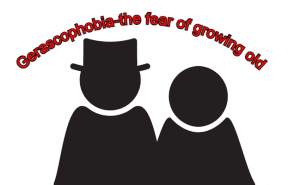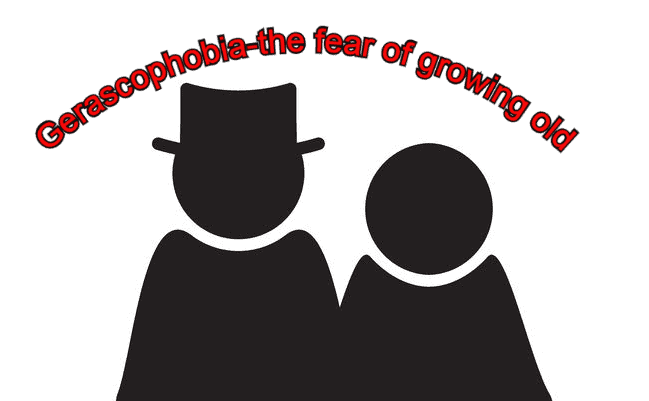Share This Article
Gerascophobia: The Fear of Growing Old
Does watching movies like The Notebook or Tokyo Story make you feel weird, yet you find solace in watching The Curious Case of Benjamin Button?
Do you get hot flushes or chills every time someone talks about growing old? Does your heart beat faster or do you feel a choking sensation when someone talks about what age is doing to their body? If the answer to all or any of these questions is yes, chances are that you may be suffering from gerascophobia.
Before you try to face your fear, it’s a good idea to learn a little about it. Read on for things you should know about gerascophobia, or the fear of growing old.

What Is Gerascophobia?
What is the word for the fear of growing old? That term is gerascophobia. The word consists of the Greek phrase tha geraso which translates to ‘I am getting older’ and phobos which means a dread of something. In short, gerascophobia is the fear of growing old.
Most people fear getting older. With increasing age comes a decrease in physical and mental functions, such as receding gums, weight fluctuations, memory loss, and much more. To top it off, we may begin to experience an increase in our fear of death. Humans have been searching for that secret youth potion since time immemorial. We’re no strangers to stories of explorers seeking that magic fountain of youth.
Is gerascophobia common? Four to six percent of Americans suffer from the fear of growing old. In extreme cases of gerascophobia, one experiences constant irrational fear of getting old. Their eyes are fixed on the ticking clock. The adverse effects and consequences this phobia can have on an individual are many. It can interfere with one’s social, professional, and personal life.
More often than not, an individual with gerascophobia realizes that the fear of growing old is ridiculous, but they feel powerless. Do you wonder what causes gerascophobia or continuously ask yourself why am I scared of growing old? It’s a clinical phobia that’s generally classified under a single panic trigger. It may be based on your anxieties related to being left alone. Some might feel they are incapable of taking care of themselves due to the disabilities that come along with old age.
Gerascophobia Symptoms
Before we talk about symptoms, it’s important to understand that different individuals have different responses to a particular phobia. The intensity of the fear you feel may be different from someone else going through the same thing. Some, however, get so overwhelmed and afraid of aging that they get anxiety and panic attacks along with the following symptoms:
Mental/Emotional Symptoms
Mental and emotional symptoms are those that affect the mind and cannot be seen by the naked eye.
- Disconnection from reality, muddled head, and inability to express
- Helplessness, hopelessness, and feelings of loss of control
Physical Symptoms
Physical symptoms are the symptoms that affect the body and can be seen or recognized.
- Dizziness
- Shaky balance, shivering, and chills
- Heart palpitations/increased heart rate
Behavioral Symptoms
Behavioral symptoms are persistent or repetitive behaviors that are unusual, disruptive, inappropriate, or problematic. One may face the following:
- Aggression
- Frustration
- Irritation
It is quite normal for a person to feel completely withdrawn if he/she is experiencing such symptoms. This can greatly affect your day-to-day life, too. Excessive worrying about having this phobia might also lead you to feel stressed, which can further cause health issues. You are more likely to be at risk of high blood pressure or heart disease.
Treatment for Gerascophobia
Now that you know the symptoms, you’re probably wondering how you get over the fear of growing old? How do you treat gerascophobia? This fear can be treated with self-help methods, or you might seek professional help as well. If you’re looking to confront your fear on your own, here are some pointers that may help you:
Self-Help
To begin with, you need to come up with a self-help program that helps you face and confront your fears. You can consult a psychologist before creating one on your own or you can refer to these points:
- Lifestyle changes can help with symptoms, such as panic attacks. Eating healthy meals and exercising regularly, reducing caffeine and other stimulants, and getting proper sleep at night could be a few.
- Relaxation techniques help you control and relax your breathing. You can work on your visualization techniques where you see yourself fiercely dealing with your phobia. This combines relaxation and breathing techniques.
- Self-help groups are another useful method of overcoming a phobia. Seek out like-minded people and share your experiences with them. Sometimes, opening up and talking out loud about your fears can take you a long way. Those who are dealing with the same thing are more likely to relate to you. Together you can overcome your phobias.
- Beyond that, self-help techniques such as yoga and meditation can help a great deal.
Professional Help
In case you’re unable to deal with your phobia on your own, there are plenty of professional methods out there to help you. Consult a mental health professional to obtain a proper diagnosis and discuss possible treatments. Here are just two techniques that can be explored:
- Exposure therapy is a type of therapy closely related to cognitive behavioral therapy (CBT). It consists of five steps: evaluation, feedback, developing a hierarchy against fear, exposure, and building upon the rationalization steps. Your therapist would help you change the way you think about your phobia. They would help you rethink your thoughts, feelings, and responses about aging and teach you how to better control them. This process might also include looking at pictures or videos involving aging to help you confront your fear.
- Energy psychology or the emotional freedom technique is a form of acupuncture technique that doesn’t require needles. It will help you get to the root of the phobia. It can also help remove any kind of negative association you may have with growing old.
How to Avoid Gerascophobia
If you’re feeling the pangs of a fear of growing old, or if you’re already struggling with the fear on a daily basis, here are some things you can do to help you better manage your fear and discomfort.
Maintain a Positive Outlook
There is no escaping getting old. While this might make us feel powerless or overwhelmed, it’s important to be optimistic. We need to focus on the positives about ourselves, others, and the world around us. Be grateful and appreciate all the great things you have in life.
Embrace Your Fears
As we get older, our fears about aging grow bolder. If you want to grow old happily, the key is to pay attention to your phobia and confront it sooner rather than later. Hear what your body and brain are trying to tell you; listen to what it needs.
Create Cheerful Daily Habits
Learn to live in the present and not care too much about the past or the future. As you make some lifestyle choices, reward yourself once in a while with some breaks. Take time for things you like to do. Don’t chase success. Stay where you are to enjoy the moment you are in.
Explore Elderhood
The society that we live in provides us with quite a few useful guidelines about growing old with a positive outlook. The elder in each family may be responsible for solving a crisis, upholding values, and mentoring the young. You need to be your own elder. Be there for yourself.
In Conclusion
As a society, we need to work to accept that there is nothing wrong with aging. All of us will grow old. While everyone wants to leave a mark in this world, it’s essential to understand the importance of being present. We need to start living in the present, focusing on the people around us, living in the moment, and living our lives to the fullest.




